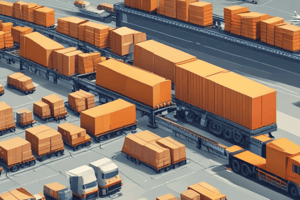Podcast
Questions and Answers
What is the dominant mode of transport for shipments larger than 100,000 pounds?
What is the dominant mode of transport for shipments larger than 100,000 pounds?
- Road transport
- Motor carriers
- Rail (correct)
- Air carriers
Which factor contributes to the high variable cost per kilometer in road transport?
Which factor contributes to the high variable cost per kilometer in road transport?
- Lower labor costs due to automation
- Cost of tolls taken by carriers
- Maintenance costs of public roads
- Fuel costs (correct)
For which scenario is road transport best suited?
For which scenario is road transport best suited?
- Delivering high-value products over short distances (correct)
- Shipping hazardous materials quickly across states
- Long-distance freight of low-value goods
- Transporting bulk commodities over long distances
What is a major problem faced by motor carriers during long journeys?
What is a major problem faced by motor carriers during long journeys?
What advantage does road transport provide in terms of delivery?
What advantage does road transport provide in terms of delivery?
What is a primary goal of marketing logistics management?
What is a primary goal of marketing logistics management?
Which of the following is NOT a trend in logistics according to the recent developments?
Which of the following is NOT a trend in logistics according to the recent developments?
What role does blockchain technology play in logistics?
What role does blockchain technology play in logistics?
Why are companies incorporating sustainability initiatives in logistics?
Why are companies incorporating sustainability initiatives in logistics?
How are data analytics and AI contributing to logistics management?
How are data analytics and AI contributing to logistics management?
Flashcards are hidden until you start studying
Study Notes
Essence of Marketing in Logistics
- Marketing logistics is essential for ensuring goods reach the right customers at the right time and places.
- A thorough marketing logistics plan analyzes the need, delivery method, timing, and information sharing requirements for finished products.
Current Trends in Logistics
- Automation and Robotics: Warehouses are increasingly adopting automated systems such as robotics and AGVs to enhance efficiency and reduce labor costs.
- Sustainability Initiatives: Companies are implementing eco-friendly practices, including electric vehicles, energy-efficient warehouses, and route optimization to reduce carbon footprints.
- Blockchain Technology: Blockchain introduces transparency, security, and traceability into supply chains.
- Last-Mile Delivery Innovations: Solutions like drones, autonomous vehicles, and local delivery partnerships are improving last-mile efficiency
- Data Analytics and AI: Advanced analytics and AI are used to optimize inventory management, demand forecasting, and real-time tracking, ultimately leading to cost reduction and enhanced decision-making.
Road Transport
- Economic Aspects: Road transport has relatively low fixed costs, especially when operating on publicly funded high-speed and toll-free roads. However, variable costs per kilometer are high, with substantial fuel, tire, maintenance, and labor expenses.
- Strengths: Road transport excels in short-distance shipments and high-value goods. Its flexibility allows for door-to-door delivery, and its speed is suitable for short and medium distances.
- Suitable Applications: Delivery of perishable foods and e-commerce deliveries within cities and states are examples of suitable applications for road transport.
- Challenges: Legislative control and driver fatigue pose challenges for long-haul road transport.
Multimodal Transport
- Definition: Multimodal transport combines multiple modes of transportation, such as rail carriers, air cargo freight, and truck carriers, to deliver a shipment.
- Single Carrier: A single multimodal transport operator or provider handles the entire process, relying on a network of smaller carriers.
- Evolutionary Developments: Technological advancements in air transport, safety regulations, and communication systems have significantly impacted global transportation services.
- Complexity: The intermingling of various transport modes has increased complexity in efficient, reliable long-range transport planning.
- Contractual Challenges: Identifying the legally liable party when considering claims can be difficult.
- Indian Government Regulation: The Multimodal Transportation of Goods Act 1993 addresses the practical and legal complexities associated with multimodal transport.
- Features:
- Shippers provide detailed shipment information to the multimodal transport operator (MTO).
- The MTO performs independent inspections to ensure accuracy.
- The MTO is fully responsible for the goods' safety and integrity.
- The MTO guarantees on-time delivery within the contract.
- Delivery is complete when goods reach the owner.
- The customer has the right to access information about all contractors involved.
- The contract includes explicit cost details.
- Scheduling is crucial, and missed deadlines result in financial compensation for the customer.
- Multimodal transport is typically used when direct communication between the supplier and recipient is absent, or when alternative modes are too costly or time-consuming.
- The MTO undertakes tasks such as document preparation, contracting with carriers, terminal leasing, and customs clearance.
Distinction between Intermodal and Multimodal Transport
- Intermodal Transport: Involves several companies participating independently in the transportation process.
- Multimodal Transport: Involves a single company responsible for the entire process.
- Responsibility: In intermodal transport, responsibility is distributed among all participants, leading to complications in determining liability for damage.
- Documentation: Intermodal transport requires multiple packages of documents for each company involved, while multimodal transport utilizes a single package covering all goods.
Studying That Suits You
Use AI to generate personalized quizzes and flashcards to suit your learning preferences.




